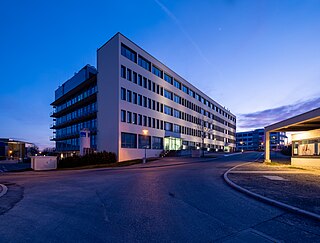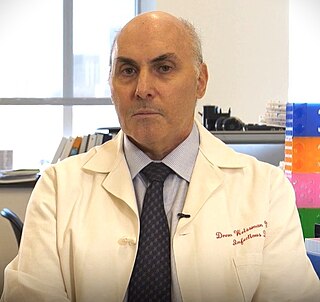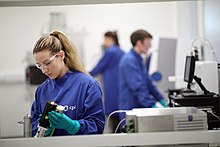
Tees Valley is a combined authority area in Northern England, around the lower River Tees. The area is not a geographical valley; the local term for the valley is Teesdale. The combined authority covers five council areas: Darlington, Hartlepool, Middlesbrough, Redcar and Cleveland and Stockton-on-Tees.

The European Medicines Agency (EMA) is an agency of the European Union (EU) in charge of the evaluation and supervision of pharmaceutical products. Prior to 2004, it was known as the European Agency for the Evaluation of Medicinal Products or European Medicines Evaluation Agency (EMEA).
Dr. Reddy's Laboratories is an Indian multinational pharmaceutical company based in Hyderabad. The company was founded by Kallam Anji Reddy, who previously worked in the mentor institute Indian Drugs and Pharmaceuticals Limited. Dr. Reddy manufactures and markets a wide range of pharmaceuticals in India and overseas. The company produces over 190 medications, 60 active pharmaceutical ingredients (APIs) for drug manufacture, diagnostic kits, critical care, and biotechnology.
This page provides an alphabetical list of articles and other pages about biotechnology.

WMG, University of Warwick is a UK-based research and education group combining collaborative research and development with education programmes working in applied science, technology and engineering. An academic department of the University of Warwick and a centre of the High Value Manufacturing Catapult, WMG was founded by Kumar Bhattacharyya in 1980 to help reinvigorate UK manufacturing and improve competitiveness through innovation and skills development.

Santaris Pharma A/S was a biopharmaceutical company founded in 2003 in Copenhagen, Denmark. The company also had a branch in San Diego, California that opened in 2009. Created by a merger between Cureon and Pantheco, Santaris developed RNA-targeted medicines using a Locked Nucleic Acid (LNA) Drug Platform and Drug Development Engine.
Eurogentec is a biotechnology supplier, based in Belgium, that specializes in genomics and proteomics kits, reagents, and certain biologics. It was founded in 1985 as a spin-off from the University of Liège. Eurogentec operates two licensed contract manufacturing organization facilities in Belgium which produce custom biologic and oligonucleotide products mainly for European pharmaceutical companies, but also holds a license from the U.S. FDA to export a commercial protein product to the U.S.. These products are used to diagnose and treat various conditions.
The Shannon Applied Biotechnology Centre is a partnership between the Institute of Technology, Tralee (ITT) and Limerick Institute of Technology (LIT,) and is co-located between these research institutes in Ireland. Shannon ABC applies bioprocessing to a variety of different source materials to derive added value from them in the area of biological products
The North East of England Process Industry Cluster (NEPIC) is an economic cluster developed in accordance with Michael Porter's theories and strategies regarding industrial clusters. The chemistry-using sectors in North East England, where more than 1,400 businesses are headquartered in the industry's supply chain, formed this Process Industry Cluster. In the north-east of England, the industry employs approximately 35,000 direct workers and around 190,000 indirect workers, who collectively account for more than one-third of the area's industrial economy. Companies in the cluster produce 35% of the pharmaceuticals and 50% of the petrochemicals used in the UK, making this area the only net exporter of goods from the country. The area has more than £13 billion in exports.

CureVac N.V. is a German biopharmaceutical company. It develops therapies based on messenger RNA (mRNA). Headquartered in Tübingen, Germany, the company was founded in 2000 by Ingmar Hoerr (CEO), Steve Pascolo (CSO), Florian von der Mulbe (COO), Günther Jung, and Hans-Georg Rammensee. CureVac has approximately 375 employees since May 2018.

Moderna, Inc. is a pharmaceutical and biotechnology company based in Cambridge, Massachusetts, that focuses on RNA therapeutics, primarily mRNA vaccines. These vaccines use a copy of a molecule called messenger RNA (mRNA) to carry instructions for proteins to produce an immune response. The company's name is derived from the terms "modified", "RNA", and "modern".

Novavax, Inc. is an American biotechnology company based in Gaithersburg, Maryland, that develops vaccines to counter serious infectious diseases. Prior to 2020, company scientists developed experimental vaccines for influenza and respiratory syncytial virus (RSV), as well as Ebola and other emerging infectious diseases. During 2020, the company redirected its efforts to focus on development and approval of its NVX-CoV2373 vaccine for COVID-19.
Catapult centres are a network of nine organisations set up by Innovate UK in the United Kingdom, to promote research and development (R&D) and to exploit market opportunities. Catapult centres promote R&D and innovation through business-led collaboration between scientists, academics, engineers, entrepreneurs, industry leaders and Government. They receive grants from public funds but are also expected to seek commercial funding. The first tranche of Catapults were established in 2011.
Arcturus Therapeutics Holdings Inc. is an American RNA medicines biotechnology company focused on the discovery, development and commercialization of therapeutics for rare diseases and infectious diseases. Arcturus has developed proprietary lipid nanoparticle RNA therapeutics for nucleic acid medicines including small interfering RNA (siRNA), messenger RNA (mRNA), gene editing RNA, DNA, antisense oligonucleotides, and microRNA.

The Coalition for Epidemic Preparedness Innovations (CEPI) is a foundation that takes donations from public, private, philanthropic, and civil society organisations, to finance independent research projects to develop vaccines against emerging infectious diseases (EID).

BioNTech SE is a German biotechnology company based in Mainz that develops and manufactures active immunotherapies for patient-specific approaches to the treatment of diseases. It develops pharmaceutical candidates based on messenger ribonucleic acid (mRNA) for use as individualized cancer immunotherapies, as vaccines against infectious diseases and as protein replacement therapies for rare diseases, and also engineered cell therapy, novel antibodies and small molecule immunomodulators as treatment options for cancer.

Drew Weissman is an American physician and immunologist known for his contributions to RNA biology. Weissman is the inaugural Roberts Family Professor in Vaccine Research, director of the Penn Institute for RNA Innovation, and professor of medicine at the Perelman School of Medicine at the University of Pennsylvania (Penn).
The Vaccines Manufacturing and Innovation Centre (VMIC) is a vaccine research and manufacturing facility under construction in Harwell Science and Innovation Campus in Oxfordshire, England. Announced in December 2018 and originally planned to be opened in 2022, its planned opening date has been brought forward to 2021 as a response to the COVID-19 pandemic.
Pieter Rutter Cullis is a Canadian physicist and biochemist known for his contributions to the field of lipid nanoparticles (LNP). Cullis and co-workers have been responsible for fundamental advances in the development of nanomedicines employing lipid nanoparticle (LNP) technology for cancer therapies, gene therapies and vaccines. This work has contributed to five drugs that have received clinical approval by the US Food and Drug Agency (FDA), the European Medicines Agency, and Health Canada.
NETPark, or the North East Technology Park, is a science park in Sedgefield, Durham. It is owned by Durham County Council and run by Business Durham, the business support service of the council, with strategic partners Centre for Process Innovation (CPI) and Durham University.











